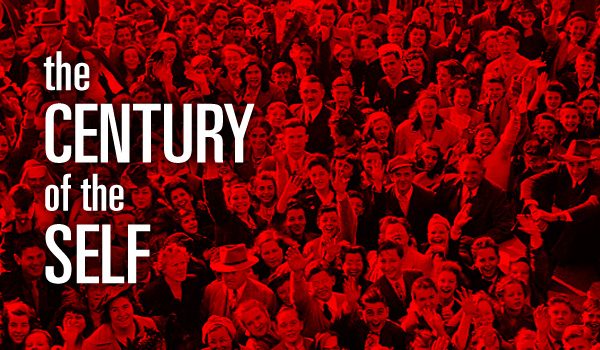The Century of the Self – To many in both politics and business, the triumph of the self is the ultimate expression of democracy, where power has finally moved to the people. Certainly the people may feel they are in charge, but are they really? The Century of the Self tells the untold and sometimes controversial story of the growth of the mass-consumer society in Britain and the United States. How was the all-consuming self created, by whom, and in whose interests?
The Century of the Self part 1
The Freud dynasty is at the heart of this compelling social history, from Sigmund to Matthew: Sigmund Freud, founder of psychoanalysis; Edward Bernays, who invented public relations; Anna Freud, Sigmund’s devoted daughter; and present-day PR guru and Sigmund’s great grandson, Matthew Freud, who became part of the new marketing culture that took over politics in Britain when New Labour swept to power in the 1990s.
Sigmund Freud’s work into the bubbling and murky world of the subconscious changed the world. By introducing a technique to probe the unconscious mind, Freud provided useful tools for understanding the secret desires of the masses. Unwittingly, his work served as the precursor to a world full of political spin doctors, marketing moguls, and society’s belief that the pursuit of satisfaction and happiness is man’s ultimate goal.
The Century of the Self part 2
In this first programme of the series, Happiness Machines tells the story of the relationship between Sigmund Freud and his American nephew, Edward Bernays. Bernays invented the profession of public relations in the 1920s and was the first person to take Freud’s ideas to manipulate the masses. He showed American corporations how they could make people want things they didn’t need by systematically linking mass produced goods to their unconscious desires. Bernays was one of the main architects of the modern techniques of mass-consumer persuasion, using every trick in the book, from celebrity endorsement and outrageous PR stunts, to the eroticisation of the motorcar.
The Century of the Self part 3
His most notorious coup was to break the taboo on women smoking by persuading them that cigarettes were a symbol of independence and freedom. But Bernays was convinced that this was more than just a way of selling consumer goods. It was a new political idea of how to control the masses. By satisfying the inner irrational desires that his uncle had identified, people could be made happy and thus docile. It was the start of the all-consuming self which has come to dominate today’s world.
The Century of the Self part 4
The second programme, The Engineering of Consent, explores how Freud’s ideas about the unconscious mind were used by those in power in post-war America to try and control the masses. Politicians and planners came to believe Freud’s underlying premise – that deep within all human beings were dangerous and irrational desires and fears. They were convinced that it was the unleashing of these instincts that had led to the barbarism of Nazi Germany. To stop it ever happening again they set out to find ways to control this hidden enemy within the human mind.
Sigmund Freud’s daughter, Anna, and his nephew, Edward Bernays, provided the centrepiece philosophy. Their ideas were used by the US government, big business, and the CIA to develop techniques to manage and control the minds of the American people. But this was not a cynical exercise in manipulation. Those in power believed that the only way to make democracy work and create a stable society was to repress the savage barbarism that lurked just under the surface of normal American life.
There is a Policeman Inside All Our Head: He Must be Destroyed is the third programme in the series. In the 1960s, the influence of Freudian ideas in America was challenged by a radical group of psychotherapists. They were inspired by the ideas of Wilhelm Reich, a pupil of Freud’s, who had turned against him and was hated by the Freud family. He believed that the inner self did not need to be repressed and controlled. It should be encouraged to express itself.
The Century of the Self : Unmasking the Power of PR and Advertising
The Birth of Public Relations
In the early 20th century, a seismic shift occurred in the world of advertising. The strategy once aimed to influence rational choice, but it pivoted to connect feelings with a product. The pioneer of this transformation was none other than Sigmund Freud’s nephew, Edward Bernays, who invented the field of public relations. Bernays was not just another name in the world of advertising. He was a master of manipulation, employing his uncle’s theories about the unconscious to increase sales. His influence extended beyond commerce, reaching political terrain and changing public opinions on various issues.
Harnessing the Power of Unconscious Desires
The innovative approach of Bernays was based on a single premise – exploiting the public’s unconscious fears and desires. “The Century of the Self”, a fascinating four-part BBC documentary, shows how corporations, and later politicians, tapped into this idea, effectively selling not only products but also self-images and emotional aspirations.
The documentary is a must-watch for anyone seeking to understand the nuances of corporate marketing. It portrays an ugly dystopian truth hidden behind the bland normality of consumer culture. Whether it’s about the seemingly non-materialistic hippies or the ordinary consumers of the 1980s, it compellingly illustrates how products were sold and lifestyles marketed.
The Lasting Impact and Implications
The legacy of Bernays is still evident today. The concept of “lifestyle” is now routinely used in sales pitches, and appeals to self-image have become so embedded in advertising that we scarcely notice them. However, this shift from rationality to emotional appeal wasn’t a mere marketing gimmick. It was a calculated strategy, reflecting the belief that rational choice, particularly by crowds, was unreliable, thereby necessitating “guidance from above” from political leaders and corporations.
This strategy has left an indelible mark on our society, changing not just how products are marketed but also how we perceive ourselves and our desires. It has made us question the authenticity of our choices and the extent to which we are influenced by external forces.
“The Century of the Self” offers a sobering reminder of the power of public relations and advertising. It’s a journey into the heart of our consumer culture, unraveling the intricate web of influences that shape our desires, aspirations, and ultimately, our identities.




